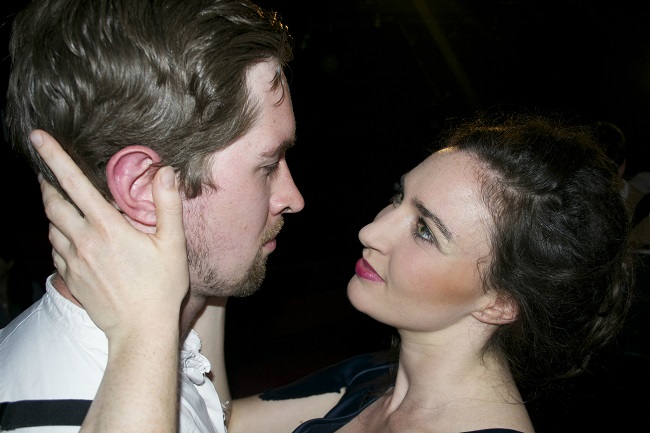
It’s productions like Lovett + Todd, currently playing at the King’s Head Theatre, that make me wonder whether my expectations of small-venue theatre are too high. There’s a pit-of-the-stomach pang that hits you around the 20-minute mark of particularly bad plays where you realise it’s not going to get better. A mixture of anguish and bemusement that is the equivalent of a knowing, sorrowful smile across the Christmas lunch table from a sibling as you listen to grandad launch into another “I’m not a racist but” tirade about all the bloody immigrants on the high street. There’s nothing we can do that won’t cause acute embarrassment; we have to just sit it out.
The first few minutes of the play were lost to the ungodly rattlings coming from the AC unit at the back of the room and, once that had been switched off, the rest was a slow descent into the ludicrous atmosphere of a Roman sauna with entertainment thrown in with the entry fee.
Despite these distractions, it was easy enough to understand the story being told. Two sisters lose their mother, sell pies to make money, decide to swap the expensive animal meat with human meat, one of the sisters decides to source it from the local barber Sweeney Todd who she persuades to become a murderer, they carry on until he breaks down and admits everything to friends, Mrs Lovett points the finger at him, the end. It’s a retelling of the nugatory tale of Sweeney Todd from the woman’s position with no added nuance, intensity or dexterity. The moment they decided to start using human meat, a decision disturbing and shocking in equally deep measures, went something like, “hey, shall we us people meat in the pies instead” “yeah k”. And if you thought that was lazy writing, just wait until you hear the cast try to rhyme “full” with “dull” in ‘Fancy a pie?: 8th reprise’.
The play is presented in musical form but I wouldn’t hold out for a Lovett + Todd song making an appearance on a “Liza Minelli Sings Musicals Hits” album anytime soon. It is impossible to work out whether this is a serious production showing the intolerable conditions of Victorian London for the lower classes (think Les Misérables with cockney accents and hot water crust pastry) or as a farcical comedy, which would be uncomfortable, seeing as the first laugh came 40 minutes into the play. Another laugh came when Sweeney joined in with three other characters in a barbershop-quartet-style song. Geddit? Barbershop. He’s a barber. Do you get it?
Towards the end, Sweeney loses a little of his confidence and wants to stop killing customers and baking them in pies but Mrs Lovett convinces him to carry on. A quarter of an hour later, at the end of the play, we find ourselves in a very similar situation with strikingly similar dialogue. It’s at this point you realise there is more filler in the script than in the Asda Value pork pies being used as props.
Good productions in small theatres are often described as diamonds in the rough, and there is an expectation, where once it was merely hope, that all theatre will be of the same high standards we hear about in the weekend papers and late-night BBC arts programmes. But they can’t all be five-star, box-office-smashing, west-end-transferring triumphs. Sometimes we have to hit a dud. And the same goes for the cast and crew. I’ve no doubt that all involved with Lovett + Todd will go on to bigger and better productions but they are also likely to be involved with more flops along the way and that’s no personal failure. It’s part of the itinerary of being involved in theatre and should be a bend in the road not an engine blow-out.
Because that’s what it means to take a risk. And the same is for those audience-members who fill the 20, 30-strong theatres all over the country every night of the week. If you want a dead cert, I’d suggest The Lion King at The Lyceum Theatre. If you want to take a punt on something new that might just be the next best thing then pay your tenner and file into the small, dilapidated performance space that awaits and keep your fingers crossed. The beauty of small-scale theatre is that the highs are that much higher for having seen the lows.



